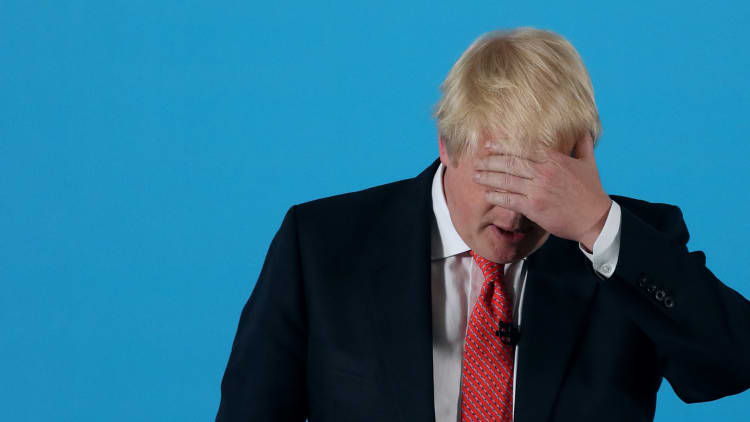The U.K. and the EU have many differences yet to overcome as they try to get a new trade deal by the end of the year — a political hot potato that could bring additional economic uncertainty, for both.
The U.K. stopped being a full member of the European Union (EU) in January, but it is still in a transition period until the end of the year, so it can negotiate new trade arrangements with its closest partners. However, after three rounds of talks, negotiators have complained about the lack of progress.
David Frost, the U.K.'s negotiator, said Friday there had been "very little progress towards (an) agreement on the most significant outstanding issues between us." In Brussels, the EU's negotiator, said Friday it was a "disappointing" round.
What are the issues?
One of the sticking points is about the "level playing field" for businesses.
Both sides agreed last year "to develop an ambitious, wide-ranging and balanced economic partnership," which will be "underpinned by provisions ensuring a level playing field for open and fair competition."
This means that there should be common rules and standards to prevent British businesses from undercutting their European competitors, and vice-versa. However, it seems there's a different interpretation of what was agreed.

Speaking last week, Barnier said "the United Kingdom did not engage in a real discussion on the question of the level playing field."
On the other hand, Frost said "the major obstacle" to progress is "the EU's insistence on including a set of novel and unbalanced proposals on the so-called 'level playing field' which would bind this country to EU law or standards."
Furthermore, there's also the question about fisheries.
The British government wants "annual negotiations" on access to U.K. waters. However, EU fishermen, who rely on being able to fish in U.K. waters, have said they do not want discussions on quotas and access every year. They are concerned they will have limited, if any, access to the U.K.
"The EU continues to insist on fisheries arrangements and access to U.K. fishing waters in a way that is incompatible with our future status as an independent coastal state," Frost said Friday.
Barnier said their positions on fisheries "remain very far apart."
Speaking to CNBC Tuesday, Tom Raines, from Chatham House, said there are "significant philosophical differences" between the two sides.
The hit to the U.K. economy will be unwelcome and we have to brace for a significant recession.Anna RosenbergSignum Global
They also seem to disagree about the implementation of previous agreements. One of the pre-conditions for the U.K.'s departure from the European Union was to avoid a hard border between Northern Ireland and the Republic of Ireland.
Both sides agreed in 2019 that Northern Ireland will remain part of the U.K. customs territory — meaning if the U.K. signs a trade deal with, say, the U.S., the latter will also buy Northern Irish products. However, it was also agreed that to preserve the EU's single market, there will be checks and controls on goods moving from Great Britain to Northern Ireland.
Barnier said Friday that the U.K. has not yet explained how it will implement that part of the agreement.
Why it matters?
Both sides have to decide by the end of next month if they need much more time to negotiate a trade deal or not. They have until December to conclude a free trade agreement, but they could extend that for one or two years more.
The U.K. has often said it will not extend negotiations. If they don't have an agreement by the end of the year, there could be hefty duties on goods and services moving across the English Channel.
This would be costly for businesses on both sides.

"For the U.K., and for Johnson in particular who faces more and more political challenges, the temptation will be great to group the economic disruption from Covid and Brexit together," Anna Rosenberg, from the advisory firm Signum Global, told CNBC.
She explained the prime minister can blame the economic disruption on the pandemic ahead of four additional years in office to fix the economy.
"Of course, the hit to the U.K. economy will be unwelcome and we have to brace for a significant recession, irrespective of the final Brexit deal," she also said.
However, the EU would also lose from a no-trade deal with the U.K., mainly at a time when the region is also facing economic challenges.
"For the EU, a Brexit outcome in the absence of a comprehensive deal will be bad news," Rosenberg said, "it will hit already fragile firms across the EU and add to the economic worries."


